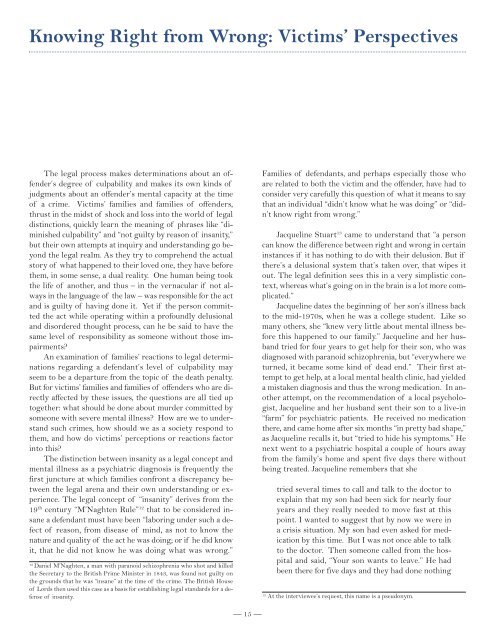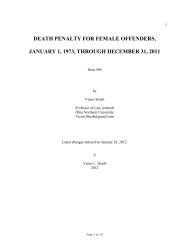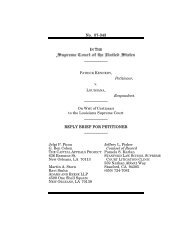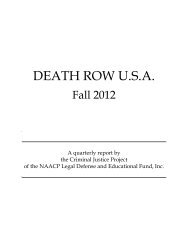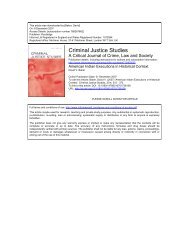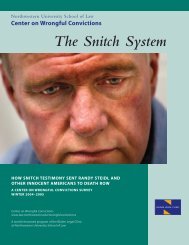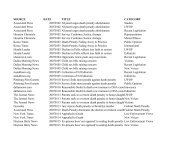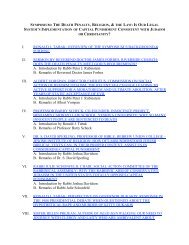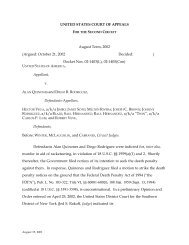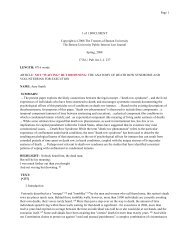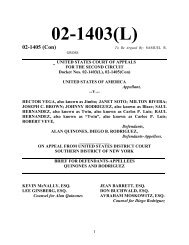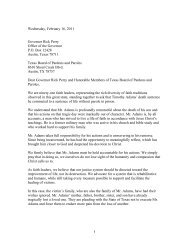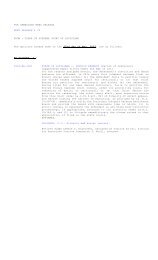Double Tragedies - Families for Human Rights
Double Tragedies - Families for Human Rights
Double Tragedies - Families for Human Rights
- No tags were found...
You also want an ePaper? Increase the reach of your titles
YUMPU automatically turns print PDFs into web optimized ePapers that Google loves.
Knowing Right from Wrong: Victims’ PerspectivesThe legal process makes determinations about an offender’sdegree of culpability and makes its own kinds ofjudgments about an offender’s mental capacity at the timeof a crime. Victims’ families and families of offenders,thrust in the midst of shock and loss into the world of legaldistinctions, quickly learn the meaning of phrases like “diminishedculpability” and “not guilty by reason of insanity,”but their own attempts at inquiry and understanding go beyondthe legal realm. As they try to comprehend the actualstory of what happened to their loved one, they have be<strong>for</strong>ethem, in some sense, a dual reality. One human being tookthe life of another, and thus – in the vernacular if not alwaysin the language of the law – was responsible <strong>for</strong> the actand is guilty of having done it. Yet if the person committedthe act while operating within a profoundly delusionaland disordered thought process, can he be said to have thesame level of responsibility as someone without those impairments?An examination of families’ reactions to legal determinationsregarding a defendant’s level of culpability mayseem to be a departure from the topic of the death penalty.But <strong>for</strong> victims’ families and families of offenders who are directlyaffected by these issues, the questions are all tied uptogether: what should be done about murder committed bysomeone with severe mental illness? How are we to understandsuch crimes, how should we as a society respond tothem, and how do victims’ perceptions or reactions factorinto this?The distinction between insanity as a legal concept andmental illness as a psychiatric diagnosis is frequently thefirst juncture at which families confront a discrepancy betweenthe legal arena and their own understanding or experience.The legal concept of “insanity” derives from the19 th century “M’Naghten Rule” 12 that to be considered insanea defendant must have been “laboring under such a defectof reason, from disease of mind, as not to know thenature and quality of the act he was doing; or if he did knowit, that he did not know he was doing what was wrong.”12Daniel M’Naghten, a man with paranoid schizophrenia who shot and killedthe Secretary to the British Prime Minister in 1843, was found not guilty onthe grounds that he was “insane” at the time of the crime. The British Houseof Lords then used this case as a basis <strong>for</strong> establishing legal standards <strong>for</strong> a defenseof insanity.__ 15 __<strong>Families</strong> of defendants, and perhaps especially those whoare related to both the victim and the offender, have had toconsider very carefully this question of what it means to saythat an individual “didn’t know what he was doing” or “didn’tknow right from wrong.”Jacqueline Stuart 13 came to understand that “a personcan know the difference between right and wrong in certaininstances if it has nothing to do with their delusion. But ifthere’s a delusional system that’s taken over, that wipes itout. The legal definition sees this in a very simplistic context,whereas what’s going on in the brain is a lot more complicated.”Jacqueline dates the beginning of her son’s illness backto the mid-1970s, when he was a college student. Like somany others, she “knew very little about mental illness be<strong>for</strong>ethis happened to our family.” Jacqueline and her husbandtried <strong>for</strong> four years to get help <strong>for</strong> their son, who wasdiagnosed with paranoid schizophrenia, but “everywhere weturned, it became some kind of dead end.” Their first attemptto get help, at a local mental health clinic, had yieldeda mistaken diagnosis and thus the wrong medication. In anotherattempt, on the recommendation of a local psychologist,Jacqueline and her husband sent their son to a live-in“farm” <strong>for</strong> psychiatric patients. He received no medicationthere, and came home after six months “in pretty bad shape,”as Jacqueline recalls it, but “tried to hide his symptoms.” Henext went to a psychiatric hospital a couple of hours awayfrom the family’s home and spent five days there withoutbeing treated. Jacqueline remembers that shetried several times to call and talk to the doctor toexplain that my son had been sick <strong>for</strong> nearly fouryears and they really needed to move fast at thispoint. I wanted to suggest that by now we were ina crisis situation. My son had even asked <strong>for</strong> medicationby this time. But I was not once able to talkto the doctor. Then someone called from the hospitaland said, “Your son wants to leave.” He hadbeen there <strong>for</strong> five days and they had done nothing13At the interviewee’s request, this name is a pseudonym.


